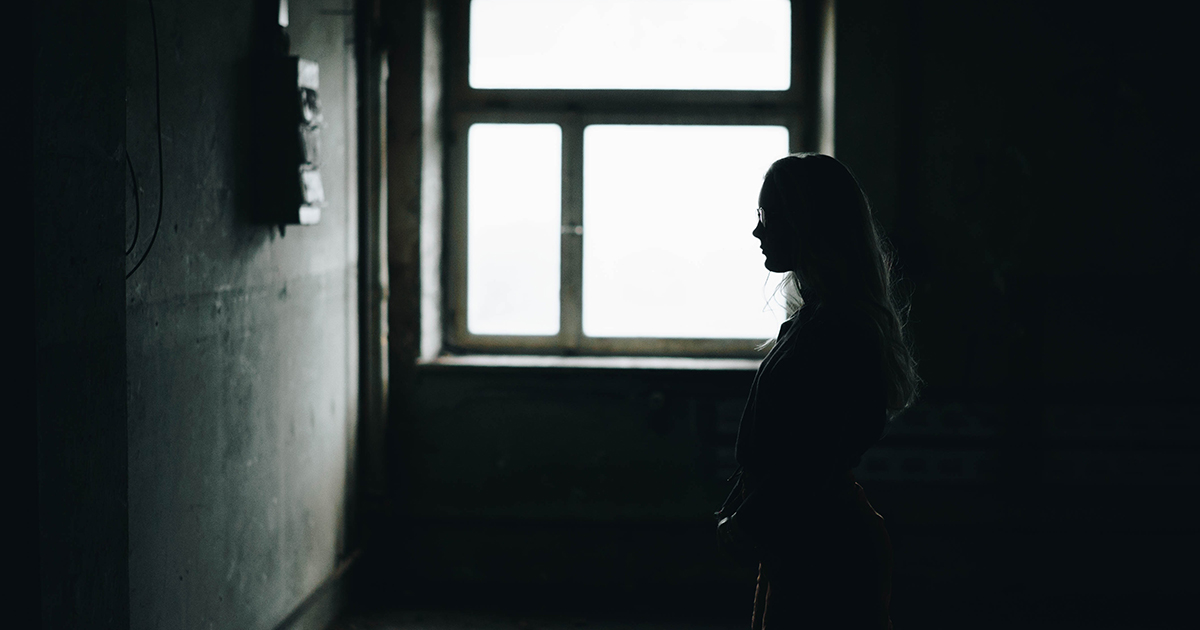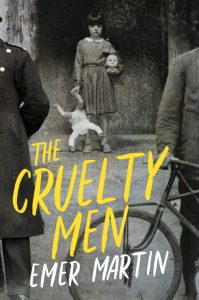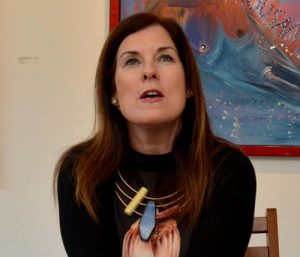EMER MARTIN
★ ★ ★ ★
FICTION

The Mountains are not Dead (1969)
We were forbidden to talk to each other when the nuns were around, and mostly did not during the week, but on Sunday we were allowed to whisper a bit after Mass and confessions. We all loved Teresa’s stories. She had a great store of them and the one we all craved was ‘The Children of Lir’. The others said Teresa had come straight from the big house in Mullingar which was an asylum, or a loony bin as they called it. I knew she was a bit mad, but she had a light spirit to her that most of us didn’t. That I couldn’t find in meself anyway.
Even Teresa said it to me: I was like the lone house at the end of the lane that never got hooked to the electricity. She said that with sadness though, and not to hurt me like when the nuns said things. I was attracted to her light. She knew how to read and she would sometimes take her time with meself and any of them young ones to show us the reading if the nuns didn’t catch us and flay her for it. She got the most beatings out of any of us. I never got the beatings anymore because I just learnt from being a wee one never to even have a thought go on in my head when them nuns were around.
One Sunday we were gathered whispering in the dormitories and Teresa was giving out to me because I had my period again. I called it ‘the curse’, because that’s what we girls always called it. The nuns called it ‘the sickness’, and some of the girls from inner city Dublin called it ‘your others’.
“Don’t worry about the mess it makes,” Teresa said. She was old and kept her hair almost shaved like most of us. I was shocked when she said she still got hers.
“Of course I still get mine,” she sniffed. “You young wans thinks the world revolves around ye. What do youse know?”
“She doesn’t know nothing,” one of them laughed at me. “She came straight from the orphanage and into here. Sure she hasn’t ever seen a fellah that’s not a priest.”
That was not true.
“I seen the gardener, Jimmy,” I protested, and they all broke their shite laughing at me.
“Much good he’d do ya! He’s ancient.”
“My lovely Bright,” Teresa said. “I know I look like an old hag but if I got out of here I could still have a baby.”
“Jaysus tonight, sure isn’t that what got you into here?” one said.
“I was put in here because I was writing poetry,” a little one said. She was new in, fourteen. “I was walking by the Dodder River in me bare feet, an I liked to dip me feet into the water and write poetry. Me ma said, ‘if youse don’t stop that I’ll send ye to the sisters.’ She found me by the river saying the poems out loud and she went and got the Cruelty Man. He and the priest took me here.”
“What’s a Cruelty Man?” one asked.
“They’re meant to be there to protect the children,” Teresa said. “To save them from cruelty. But they just shove everyone into these places. My sister used to send my brother out to the fairy ring on the hill to keep an eye out for them. Who were you saying the poems out loud to?” Teresa asked the new girl.
She shrugged and they smiled at each other. I felt a jealous pang. I had been the one Teresa looked out for until now.
“Well Teresa is in here because she had not one bastard but two.”
Teresa shrugged. “They were twins. I couldn’t help it. But then I was down as a repeat offender. So my goose was cooked.”
“How do you get out of here?” the little poet asked scratching at her baldy scalp that had just been shaved.
“You have to be claimed by a relation,” Teresa said. “Actually you have to be signed out by two men.”
“Then I’m done for.” She put her head down and big tears plopped onto her knees. “All I did was write poetry by the river.”
“You’re pretty,” I said to her. I knew it by now why they ended up here.
“And with that queer behaviour your family thought you’d be dragging their name through the mud in any time at all,” Teresa said. “Better to get rid of ya. Even if the family comes, the nuns have us all under different names and they just say we moved away. They’re raking it in here. Why would they let us go?”
The little poet stared at her in fright.
“Don’t be scaring the poor mouse,” one said.
“All I started saying was that we should not call your monthly period a curse. It’s the only colour we get in our lives and it comes from us.”
“She was in the loony bin before here,” another one winked at the little poet, tapping her head with her finger.
“Look around you, grey and grey and grey and white walls, and even the church is dark. There’s a bit of puke green on the walls but no real colour anywhere. Then once a month I get it. I know it’s hard to keep washing it out but next time look at the colour of the blood. That red is so beautiful. It starts out bright and at the end of the week it gets darker but it’s still lovely. Once I got outside into the garden and sat on the grass and let it leak into the ground. It was a lovely feeling. Ye should try it. Good for the plants too.”
We were all sniggering at her, and she looked annoyed and turned to the wall as if to sleep, so someone said quickly, so we wouldn’t lose our Sunday story, “Tell the little poet about the Children of Lir.” Her name was Dympna, but that became her name from then on, Little Poet.
“I know that story,” Little Poet lit up.
“She tells it so well,” one said, and lay back in waiting. We all settled. Even the nuns didn’t mind the stories. They saw no harm in them, I suppose.
Teresa told of the story of the four children who were turned into swans: Fionnuala, Aodh, Fiachra, and Conn. As she was telling it, I watched her eyes come alive with the spirit in her and I loved to watch her face with a wild look in it, I don’t know why. She did seem to be special among us. As if everything hadn’t been scrubbed and steamed and ironed out of her. Teresa had tried to escape three times since even I’d been there. She had got as far as the street the last time and the guards had picked her up when the nuns called them. They had taken her back and the nuns had stripped her in front of all of us and they done mortification on her, as they called it. But we were secretly glad to get Teresa back because she was the only untamed one amongst us and we didn’t know who could tell the stories like her.
Teresa was coming to the part where the wee children who had been turned into swans had done three hundred years by the lake, and three hundred years by the rough freezing Sea of Moyle. Then they got to the Western Sea and found it to be colder and more terrible than the Moyle, so they suffered greatly and were happy after the nine hundred years was up, and they could go back home to where they had once lived with their father, Lir. This was the part where we all secretly cried to ourselves. Not just me. I got a lump in my throat and then I’d shake with sobs and Little Poet looked around in astonishment at us all having our weep.
“The swans looked at the hills they had known, and every hill and mountain they could see was dark and sorrowful: not one had a star-heart of light, not one had a flame-crown, not one had music pulsing through it like a great breath.
“‘O Aodh, and Conn and Fiachra,’ said Fionnuala, ‘Beauty is gone from the earth; we have no home now.’”
The Little Poet began to rub her eyes herself as Teresa continued,
“The people of the Goddess of Dana were gone from the land, and a different people now dwelt there, who were not as shining and special. A man came to them and said he was Aibric, he was seeking for Tír na nÓg, the land of eternal youth that they had seen.
“‘The mountains are dead,’ Conn said.
“‘The mountains are not dead,’ said Aibric. ‘They are dark and silent, but they are not dead. I know. I have cried to them in the night and laid my forehead against theirs and felt the beating of their mighty hearts. They are wiser than the wisest druid, more tender than the tenderest mother. It is they who will keep the world alive.’
“‘O,’ said Fionnuala, ‘if the mountains are indeed alive let us go to them; let us tell them our sorrowful story. They will pity us and we shall not be utterly desolate.’
“But when they flew to the mountain, it looked dark and sombre against the fading sky and the sight of it, discrowned and silent, struck chill to the hearts of the wild swans.
“But Aibric stretched his hand out to the mountain and cried out, ‘O beautiful glorious mountain, pity us, Tír na nÓg is no more, welcome the children of Lir, for we have nothing left but you and the earth of Ireland.’”
“Girls,” Sister Paul came in, clapping her hands noisily as if to shoo the swans from the room. “It’s time for bed. Seven on the dot. You have work tomorrow.”
We all groaned as she shut out the light and sat at her place, taking out her rosary and beginning to say the prayers loudly. They had nuns do shifts as we slept to keep us under guard though it was only really Teresa who would have bolted. Many’s a time I thought of running away, but since I’d never so much as even seen the outside world or talked to anyone who wasn’t a nun or one of their captives I didn’t know what would happen to me if I ever got out. I had never even really seen money, let alone how to get it to get food. Teresa whispered to Little Poet,
“I was raised on a mountain you know, in Bolus Head, Cill Rialaig, Ballinaskelligs, in the Barony of Ivreagh in Co. Kerry. I grew up on a farm in Meath, then I was cursed, three hundred years in the Mother and Baby Home, three hundred years in the big house in Mullingar, and now three hundred years as a Magdalene. My time is almost up. I can feel that it is coming to an end. This ordeal is over. Come with me next time, Little Poet. Do ya want to become like Bright over there? She’s been here so long, walked through a tunnel from the orphanage, through the church, and a tunnel to this laundry, she wouldn’t know what to do with no walls around her, with no doors locking her in. I’m going to go next week when the trucks come in the back from the hospitals. I’m going to get in them, hide, and go with them.”
I was jealous she was talking to Little Poet. For when I first came, she had taken me under her wing, and I felt like she was our big sister. So this is what it was like to be on the Sea of Moyle under Fionnuala’s wing. She had asked me to come with her many times but I was too scared.
I was the girl at the end of the dormitory, lying here without so much as the chance of a dream to come to me in the night, for what could I dream of but the washing coming in with blood and shite on it? What dreams come into the dark house at the end of the lane, with broken windows and a smokeless chimney? They called me Bright but my lights were out, so they were.
I that brought the winter in.
The next night Little Poet was crying in her bed and Teresa snuck into the bed beside her and I heard her whisper, “My aul segotia, my great wee gersha. You’re the best girl in the whole wide world.” She stopped and said, “That’s what my sister Mary used to say to me when my daddy left us and never came back.”
So help me God, I was so frightened that she’d take Little Poet with her and never come back to me, that I told the nuns of her escape plan the next morning. Didn’t she get a beating for it that made us all weep and cry and made me get sick again so they’d stop? The nuns told her it was me who ratted her out, so she never spoke to me again after that. But I could still listen to her stories, so I could. And they watched her like hawks when the laundry trucks came and went and she, still standing with the Little Poet, lost behind the steam and the beauty that was never in me would be taken out of them both in the laundries, and their fires put out and their lights cut off, till we all slept on our beds, under guard, like a whole row of dark empty houses forgotten by the electricity. But maybe I knew what love is, love is what I done to her, only I could never tell her that was why I done it.
And knowing I had made sure Teresa would never leave me, I began to close my eyes at night and was finally able to dream. I dreamt of the big wooden door unlocking and swinging open. I dreamt I left these pale green walls. I came out and floated into the cool air and saw a green country beneath me, with shining green fields, and tall green trees, and I saw the Cruelty Men in brown shirts, like insects teaming through the country, their heads darting left and right, and all the children burrowing underground to hide. I was nothing, so I was. And they did not see me.
This is an extract from the novel ‘The Cruelty Men’ (Lilliput Press. Available to buy here.

‘Emer Martin’s novel about dark old Ireland should propel her to the forefront of Irish letters’–The Irish Times
‘The Cruelty Men is a tidal wave that drags you like a piece of debris through Irish history from the ice age to gangland Dublin. A bible of f–cked up Irishness.’ –Irvine Welsh
The Cruelty Men is a sweeping multi-generational view of an Irish-speaking family who moved from Kerry to the Meath Gaeltacht and the disasters that befall their children in Irish institutions.
In this novel, two Ireland’s run in stark parallel. A gentle country of fairy rings, blackberry picking, and poker evenings with the local priest masks a system in which the Church and State incarcerate the vulnerable for profit. The intimacy of the first person accounts draws the reader into the world of each character. Their stoicism makes their suffering all the more moving and dignified.
A delightful abundance of poetic and surreal phrases, quips and curses in this book give it a vitality and authenticity. Poignant and swift, The Cruelty Men tells an unsentimental yet emotional tale of survival in a country proclaimed as independent but subjugated by silence.

EMER MARTIN—Author of The Cruelty Men
Her first novel Breakfast in Babylon won Book of the Year 1996 in her native Ireland at the prestigious Listowel Writers’ Week. Houghton Mifflin released Breakfast in Babylon in the U.S. in 1997. More Bread Or I’ll Appear, her second novel was published internationally in 1999.
Emer studied painting in New York and has had two sell-out solo shows of her paintings at the Origin Gallery in Harcourt St, Dublin.
Her third novel Baby Zero, was published in the UK and Ireland March 07, and released in the U.S. 2014. She released her first children’s book Why is the Moon Following Me? in 2013. Pooka is a Halloween book for children released in 2016. Her latest children book The Pig who Danced was released in 2017.
She completed her third short film Unaccompanied. She produced Irvine Welsh’s directorial debut NUTS in 2007. Emer was awarded the Guggenheim Fellowship in 2000. The Irish Times on her most recent work The Cruelty Men, said “[it] should propel an already proven and prodigious talent to the forefront of contemporary Irish letters.”
She was recently one of the judges for the New Irish Writing in Germany Award.
She now lives between the depths of Silicon Valley, CA and the jungles of Co. Meath, Ireland.

DEAR READER
At The Wild Word we are proud to present some of the best online writing around, as well as being a platform for new and emerging writers and artists.
As a non-profit, the entire site is a labour of love.
If you have read the work in The Wild Word and like what we do, please put something in our tip jar to keep this amazing platform alive.
THANK YOU FOR YOUR SUPPORT!
























0 Comments